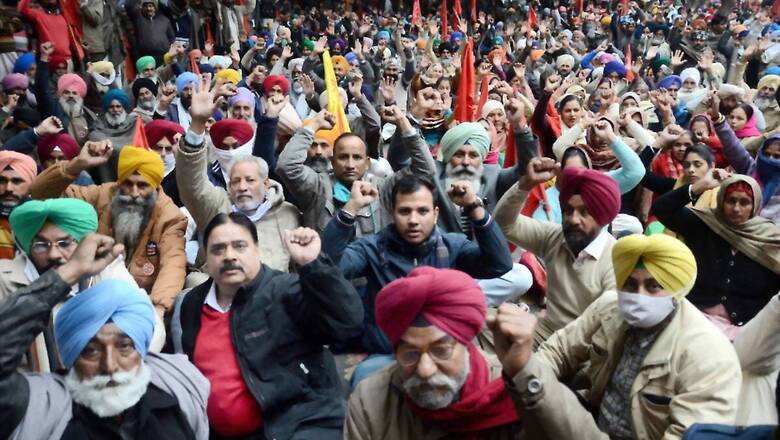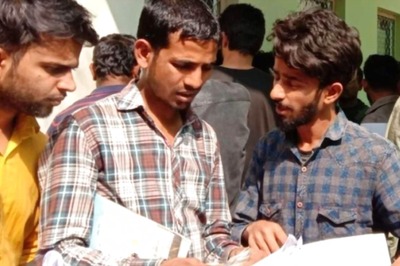
views
Despite a surge in Covid cases, several farmer unions have persisted with their protests against the Centre’s three laws for agricultural reforms passed in September last year. A committee appointed by the Supreme Court to study the laws and consult all stakeholders has submitted its report on March 19. Niti Aayog member Prof Ramesh Chand, who spearheads a lot of policy discussions on agriculture, spoke to News18 on the merits of the farm reforms, the implications of the protests— particularly on the Centre’s aim to double farmers income by 2022 for which the government think tank had prepared a road map — and what the future may hold.
The Supreme Court panel submitted its report on farm reforms on March 19. What do you expect to see in that report?
It is very difficult to speculate what is there in that report. I hope that this committee, which includes eminent experts, might have worked to the satisfaction of the Supreme Court, the expectation of the Supreme Court. As you know that after these reforms were brought, farmers initially in Punjab, Haryana and then western UP farmers also joined them. So they protested for a long period and the Supreme Court made an earnest attempt to find a way out. So I feel that this committee might have looked into the genuineness, the reasons for taking these reforms, whether these reforms are really needed for the agriculture sector, if they are needed, what will be the benefits, what was the urgency, and all those aspects. Committee members, since they have consulted farmer unions… also except some unions which were protesting around Delhi border… I understand that they consulted a large number of farmer unions also. So they will also put forth what are the views of these farmer unions, whether they want to reject it, whether they want to see some change in it, in what form they want to go in it. So, I will say that for democracy, this is a healthy trend that we try to find a way out for a situation on which there is a serious disagreement or there is a conflict through the expert committee, through the intervention of the court… These are our institutions which are required to provide some way out of this. So I expect that the Supreme Court will look into this report and they will, I think, offer their good offices as I think the Supreme Court has done in the past to come out of this stalemate.
Considering the significance of the three farm laws, do you think that the government actually erred by not engaging in wider consultations, especially with the unions of Punjab and Haryana?
No, the government has been talking with them. Nearly eleven meetings have been held but they are all post reforms. You see, there are actually three aspects of this. One is you look into the past; also, a democratically elected government represents the wish of the people. Second, we have so many farmers’ unions, the best way is to have discussions with the states, to take the views of the state. After our Prime Minister gave a call for doubling farmers’ income, Niti Aayog created a road map for how we can achieve that. The ministry of agriculture constituted a committee for doubling farmers’ income and that committee was asked to look at how the road map prepared by the Niti Aayog can be put into practice. We put four to five sources which are needed for doubling farmers’ income: the biggest contribution, according to our calculations, was to come from better price realisation and for that we identified five to six areas of reforms. After that, the ministry of agriculture came up with model APMC law, they came up with the model contract law, the Niti Aayog came up with land lease laws.
But if you look even now at the state level, the action was very very slow. I personally visited nearly 13 states, requesting states to undertake the reforms. In some of the visits, even the vice-chairman of Niti Aayog was also with me. States would agree with us that these reforms need to be done but they somehow were afraid of protests by middlemen, as we have seen in Haryana that they did make attempts two-three times. But every time… sometimes in Karnal, traffic would be blocked by commission agents, something would happen and they would take it back. Punjab made a couple of attempts but again sometimes it was not notified, etc, etc. Then it was thought that the way out to help the states pan-India, to implement these reforms, can be that some aspect of it like trading…not marketing, trading is under the concurrent list. So the central government can make laws under that. So this is what was done in the trading Act. And contract farming was already done by many states. In fact, the Centre’s Act is no different than what is already being done by some of the states. But the Centre’s attempt was that it would be pan-India.
The Essential Commodities Act is not strictly a farm Act; it is different. You might know that even the standing committee of the department…there were thirteen political parties who were present. They also favoured that this Essential Commodities Act is only a change in some provision. This is only making things transparent when the Essential Commodities Act must be applied. Only the criteria have been laid down, otherwise, the Essential Commodities Act has been there.
So this was the background against which everyone had been talking to make use of the challenge of Covid and convert it into opportunities. People were sometimes giving examples of Roosevelt — how he used the challenge to construct roads in the US and make the US a great power. Giving the example of China, how it used the WTO challenge to take advantage of selling its produce to other countries. So, I think, it was in that spirit— why in India we should not take advantage of this challenge and convert it into an opportunity about which we have talked for eighteen years. So, on the broad contours of these reforms, all the states which represent the will of the people of that state, they have been agreeing. The meetings were held with the states after the ministry of agriculture came up with the model APMC law… I was there. None of the ministers of agriculture and marketing opposed those kinds of reforms. But, since they were not implementing it, or if they were implementing it, they were implementing it in a very diluted way. So the Centre thought that the best way to expedite is… something which is pending for the last eighteen years, let’s not waste more time. So come up with a central Act and go with it.
The central government, the minister of agriculture, had given an offer to the farmers to put the laws on hold for eighteen months — form a committee, resolve the issues, and then work on implementation on a mutually agreeable date. With the farmers’ unions refusing and rejecting that offer, do you feel that they actually missed an opportunity?
I think, again, in a democratic process, even if some decision is sometimes taken, after that we should reconsider it. The Prime Minister has given a statement in Parliament that this offer still stands. So, I appreciate that… so, maybe, because of certain compulsions or their own thinking, the leaders of the protesting unions did not accept this offer. They were just adamant that you just repeal, repeal and repeal. Whereas the government was showing a flexible attitude that we are willing to discuss it clause by clause… if there is something wrong, we are willing.
So, I will not go too much into the past. I will say that still there is an opportunity. Farmer leaders must show courage; they should rise to the occasion, they should study the laws in detail and if there is something wrong… like there are lots of misperceptions. Like in the protests, I find the farmers always saying that we want to protect our land, we don’t want our land to be taken by corporates. I tell you, there is nothing in this law that can alter the ownership of land, which can have the effect that some land transfer will happen from the farmers towards anyone who wants to enter into contract farming or something like that.
Some elements, knowingly or unknowingly, have created confusion between corporate farming and contract farming No political party, whether it is the BJP of the present or the Congress of the past… I have not seen anybody supporting corporate farming, but all political parties had been supporting contract farming. So this fear that our land may be taken over by corporates can be applicable for corporate farming, but in no way is it applicable under contract farming.
Similarly, there is this apprehension about MSP. So, I will say that these are apprehensions. We should have some faith in the government. After all the government is going back to the people including farmers for seeking their support, for seeking their votes. If it does not honour its promise to the farmers, they can always teach a lesson to any political party.
So I would say whatever has been lost is lost. The farmer unions should show courage, and they should show their willingness, and they should come prepared after studying the laws in letter and spirit, and have negotiations with the ministry of agriculture.
You have also said that unless these reforms are implemented, farmers’ income cannot be doubled by 2022. But, the question is that if they are implemented, can you assure that farmers’ income would be doubled by that time?
You see, after the implementation of these reforms, the effect would have been there in three years. The ordinances came in June 2020. So, we have the one year of 2021, then we have 2021-22 and then we have 2022-23.
I can say that if these laws were implemented or even if now they are implemented in letter and spirit, I am quite confident that we will be close to achieving this target of doubling farmers’ income. I have looked at the data of many of the states that are right on track but are now getting derailed and some Yoginder Alagh wrote in an interview today that I said this thing casually… I did not say it casually. He said that there was no road map…I had taken this publication with me, you just see this publication of Niti Aayog, published in March 2017. I will give you a particular page in which I have mentioned that these are the six reforms which need to be done. So all these reforms were very much mentioned there. It was very much part of doubling farmers’ income, and I even quantified what kind of increase in income had to come if these reforms are implemented. So it is not that these new laws came suddenly. They were very much part of doubling farmers’ income. So I feel that if these laws are, even now, say we have two years left, implemented in the true spirit, you will find they will have a big impact on the income of the farmers.
We have also read reports of the Niti Aayog recommending that the entitlement under the NFSA be diminished, or reduced from 75% to 60% in rural areas and from 50% to 40% in urban areas. What do you have to say about that? Why have you made such a recommendation, if at all?
We did not make any such recommendation. Our vice-chairman has also given interviews after getting documents from me. We never said that. What we said was the ministry of food approached the Niti Aayog, that states are asking the ministry of food to increase the allocation of food grains to the state, because there is an increase in population from 2013 to 2022… eight to nine years. So they are asking for enhanced allocation. At the same time, the ministry also asked us that since the subsidy bill is ballooning, the Niti Aayog also look at how we keep this subsidy bill manageable. So then there was a committee— it is not only Niti Aayog…from Niti Aayog, there were just two of us: our senior adviser, myself, ministry of food, MOSPI, chief economic adviser… we were all members. We just looked at projections about population, what is the increase in population, what is the increase in per capita income? In order to cover the same percentage of the population, you know, that between 2013 and 2022, per capita income in India, every year has been increasing by four to five per cent. So there is an increase in the per capita income in the country, also as a result of which the economic class which you covered in percentage terms might have gone down.
Because of these reasons, the committee only looked at that if we stick to covering two-thirds of the population, what will be the total allocation required for the new population figure of the country and what will be the subsidy required.
Similarly, if we change this… is something like lower than this or in between then… what will be the total quantity of food grain required and what will be the subsidy amount that will be needed. During the discussion, the chief economic adviser also asked Niti Aayog on which we have not yet done any work… that you look at different scenarios but also provide the rationale, that what is the rationale for retaining two-thirds of the population… if we are favouring that or what is the rationale if the Niti Aayog feels that it needs to be reduced to 50 per cent. So this was the suggestion he gave. So we did not say in the report that this should be lowered. It was only that we were weighing different scenarios corresponding to different levels of coverage of population — what is the requirement of food grain which has implications for the buffer stock and what will be the subsidy burden. Similarly, we also looked at another scenario— if we bring back the distinction between APL and BPL, then what will be the implication. Like this, we looked at different scenarios and that kind of work we keep doing. That is why Niti Aayog has been created. That you prepare different estimates corresponding to different scenarios, then a political call is taken. And sometimes, when we complete our work, we also give our opinion that the Niti Aayog is in favour of this. On this particular thing, the Niti Aayog did not make any recommendations. It was misreported.
What was the whole initiative taken?
Which initiative?
On the food security entitlements.
I am telling you… since the states are asking for higher allocation… but there should be some objective basis for that. We need to know what is the total population; in the population, what is the percentage of people who are eligible and what criteria we use.
Earlier, the socio-economic caste census was there… like that now also some work in some agency like the ministry of rural development is happening. So if you have to update something, and updating is needed, it is going to be eight years. Generally, during the Planning Commission’s time, you looked after every five years… now, periodically this is being done. So, since eight years have gone and as I said to you, during this period the population of some states has increased say by 20 per cent, for some states it has increased by 8 per cent or 10 per cent… So there is a differential growth rate in the population. Similarly, the per capita income in some of the states in eight years might have increased by seventy per cent…in some states, it must have increased less… by thirty per cent. This will change the distribution of people who are eligible to get this subsidised ration at Rs 1, 2 or 3 a kg. So you require this number on which you can base it. So you should not be holding on to some number, which has become, say, irrelevant now. So that was the sole reason for us to do… and that too we did it from the written request of the food and consumer affairs department.
What are your expectations of the SC panel report? Are they going to come up with solutions that are acceptable to everybody?
No, in my position, I should not be speculating on what this committee has said. Also, none of the committee members ever met me or even talked to me to get my input or just to discuss what they are doing. I am not saying why they did not. I am just telling you. Now, did I make an attempt to find out what is the thinking of this committee? It is not for me to prejudge or speculate what this committee will do. But, given the stature of the experts in that committee… I know Dr Ashok Gulati has for the whole of his life worked on these issues, though we had disagreements on some of these issues. Similarly, Dr PK Joshi…he also has a long experience in this area… and the biggest thing is the constituency for which these laws are made, they consulted a large number of farmer unions. It is unfortunate that those protesting farmers from Punjab, Haryana, western UP… they did not go before the committee. But the rest of the country… I understand that farmers just gave their views to them. So it will all depend on how they synthesise views of the farmers, their own expert views, looking at implications, the federal structure, constitutional provisions… So I am sure the committee might have looked into all these aspects and they might have come up with pragmatic suggestions to find solutions to this vexed issue.
Read all the Latest News, Breaking News and Coronavirus News here. Follow us on Facebook, Twitter and Telegram.




















Comments
0 comment